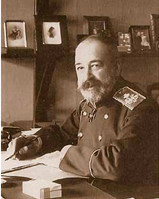
Birthday anniversary of Prince Peter D. Svyatopolk-Mirsky, statesman
18 (30) August 1857, in Vladikavkaz, was born Peter D. Svyatopolk-Mirsky. His father, Dmitri Ivanovich, General, veteran of the Caucasian and Crimean wars, descended from an ancient princely and noble family; his mother, Sophia Yakovlevna, was born Princess Orbeliani.
After graduating from the Corps of Pages in 1875, Peter Dmitrievich started to serve in the Guards Hussar Regiment of His Majesty. One year later, he was the commander of the regiment and the training team commander of His Majesty's squadron, and soon was assigned to the disposal of the commander of the Caucasian army of Grand Duke Mikhail Nikolayevich.
Baptism of fire Svyatopolk-Mirsky received during the Russian-Turkish war of 1877-1878. For his merits in the fighting he was awarded the Order of St. Anna of two classes and the Order of St. Vladimir, third class. Soon the young officer was appointed aide-de-camp of the Emperor Alexander II. After the war Svyatopolk-Mirsky entered the Nicholas Academy of the General Staff. In 1881, he was promoted to lieutenant colonel and served in various command and staff positions - was a battalion commander in an infantry regiment, staff officer of the Odessa Military District, Chief of Staff of the 3rd Grenadier Division.
In 1886 Svyatopolk-Mirsky retired and settled in his estate Gievka, Kharkov Province. In 1893 he became the Kharkov district marshal of the nobility, and then, consistently, the governor of Yekaterinoslav and Penza. In 1900 Svyatopolk-Mirsky was appointed deputy Minister of Interior, D. S. Sipyagin, and the commander of separate corps and police. In 1902, due to difference in views with the new Minister of the Interior, V. K. Plehve, Svyatopolk-Mirsky submitted his resignation. His request, however, was not satisfied, and he was soon appointed governor-general of Vilna, Kovno and Grodno; in August 1904, after the assassination of Plehve, Svyatopolk-Mirsky became Minister of Internal Affairs of the Russian Empire.
On assuming office, the new Minister delivered a speech that was enthusiastically received by the liberal community, who saw in Svyatopolk-Mirsky a precursor of sweeping reforms and an opponent of repressive policy of Plehve. This speech gave a reason to call the rule of Svyatopolk-Mirsky "the era of trust" and "the spring of Russian life." His first steps as a minister were the orders on the weakening of supervision over the press and the return from exile of political suspects.
Autumn 1904 was characterized by a broad rise in public life. A major stir caused the Zemsky congress of representatives of all classes of Russia, which took place in November in St. Petersburg, that developed a resolution declaring the need for radical reform of the state apparatus, and also required the freedom of speech, association, assembly and religion, equality before the law and the convocation of the people's representatives. The resolution received the full endorsement of Svyatopolk-Mirsky, who undertook to present its points to the emperor.
He presented to Nicholas II the reforms’ project, the main point of which was the introduction to the State Council of elected representatives of public institutions. At the meetings, held by the emperor to discuss the project, proposals of Svyatopolk-Mirsky were highly criticised by the Procurator of the Synod, K. P. Pobedonostsev, by Finance Minister, V. N. Kokovtsov, by Governor-General of Moscow, Grand Duke Sergey Alexandrovich, by Minister of Justice, N. V. Muravyov.
As a result of the meetings, Nicholas II signed a decree on reforms, with the exclusion, however, of the clause on the elected representatives. Simultaneously with the decree, a government report was published, which condemned social gatherings and promised henceforth to break them up with the police. As to zemstvo assemblies, they were forbidden to discuss political issues. These measures were met by the community with great disappointment and were seen as a new era of reaction. Immediately after the publication of the decree, Svyatopolk-Mirsky wanted to resign, but his resignation was not accepted.
3 (16) January 1905, a strike began at the Putilov factory, which soon became universal. It was led by labor organization, headed by a priest G. Gapon. Strikers had decided to submit a petition to the tsar, which, in addition to economic requirements, contained items of a political nature. In the morning of 9 (22) January, thousands of columns of workers led by Gapon marched from different parts of St. Petersburg to the Winter Palace. To stop the march, the government troops in various parts of the city made rifle volleys. The clashes with troops killed 200 men and wounded 800 men. The society was shocked by the bloodshed, the reports of which, repeatedly inflating the number of victims, spread throughout Russia.
The next day Svyatopolk-Mirsky, which the opposition had made responsible for the tragedy, resigned and was soon dismissed from the post of Minister of the Interior and did not return to political activity.
Peter D. Svyatopolk-Mirsky died 16 (29) May 1914 at age 56. He was buried in the village Gievka, Kharkov Province.
Lit.: Ананьич Б. В., Ганелин Р. Ш., Панеях В. М. Власть и реформы. От самодержавной к советской России СПб, 1996; Борисов А. В. Министры внутренних дел России. 1802 — октябрь 1917. СПб, 2001; Он же. Руководители карательных органов дореволюционной России M., 1979; Кризис самодержавия в России: 1895-1917. Л., 1984; Крылова Е. Н. Пётр Дмитриевич Святополк-Мирский и деятельность Министерства внутренних дел: дис. … канд. ист. наук. СПб, 2006; Мулукаев Р. С. Система органов внутренних дел дореволюционной России M., 1978.; Шацилло К. Ф. Русский либерализм накануне революции 1905-1907 гг. Организация. Программы. Тактика. М., 1985; Шилов Д. Н. Государственные деятели Российской империи. СПб, 2002.
Based on the Presidential Library’s materials:
Витте С. Ю. Воспоминания. Царствование Николая II. Берлин, 1923.

